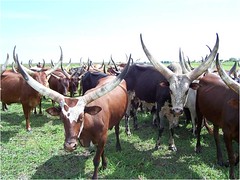Cross posted from Worldwatch Institute's http://blogs.worldwatch.org/nourishingtheplanet/innovation-of-the-week-using-livestock-to-rebuild-and-preserve-communities/">Nourishing the Planet blog. 
For pastoralist communities like the well-known Maasai in Kenya, livestock keeping is more than just an important source of food and income; its a way of life that has been a part of their culture and traditions for hundreds of years.
But, in the face of drought, loss of traditional grazing grounds, and pressure from governments and agribusiness to cross-breed native cattle breeds with exotic breeds, pastoralists are struggling to feed their families and hold on to their culture.
The key, however, to maintaining the pastoralist way of life, at least in Kenya, may also be the key to preserving the countrys livestock genetic biodiversity, as well as improving local food security.Governments need to recognize, says Jacob Wanyama, coordinator with the African LIFE Network in Kenya an organization that works to improve the rights of pastoralist communities in Eastern Africa, that pastoralists are the best keepers of genetic diversity. (See also:
http://blogs.worldwatch.org/the-keepers-of-genetic-diversity-meeting-with-pastoralist-communities-in-kenya/">The Keepers of Genetic Diversity)
Anikole cattle, for example, a breed indigenous to Eastern Africa, are not only beautiful to look at, says Wanyama, but theyre one of the highest quality breeds of cattle because they can survive in extremely harsh, dry conditionssomething thats more important than the size and milk production of the cattle, especially as climate change takes a bigger hold on Africa. And indigenous breeds dont require expensive feed and inputs, such as antibiotics to keep them healthy.
More than just a consistent and reliable source of food, Anikole cattle also help preserve the pastoralist culture and way of life. Though most pastoralists recognize that many of their children might choose to go into the cities instead of continuing the nomadic herding lifestyle of pastoralists, the preservation of Anikole cattle and other indigenous breeds will allow those that choose to stay to feed and support their families and community for years to come. (See also:
http://blogs.worldwatch.org/maintaining-links-to-tradition-in-a-changing-world/">Maintaining Links to Tradition in a Changing World)
And, similarly, in Mozambique, the
http://icu.olgwebhosting.com/irpc.php">International Rural Poultry Center of the
http://www.kyeemafoundation.org">Kyeema Foundation and
http://www.icrisat.org/newsite/">International Crops Research Institute for the Semi-Arid Tropics are promoting livestock as more than just a means to improve food security.
The two organizations are partnering to work with farmersmost of them womento raise chickens on their farms. Because women are often the primary caregivers for family members with HIV/AIDS, they need easy, low-cost sources of both food and income. Unlike many crops, raising free-range birds can require few outside inputs and very little maintenance from farmers. Birds can forage for insects and eat kitchen scraps, instead of expensive grains. They provide not only meat and eggs for household use and income, but also pest control and manure for fertilizer. (See also:
http://blogs.worldwatch.org/prescribing-improved-nutrition-to-combat-hivaids-in-africa/"http://blogs.worldwatch.org/prescribing-improved-nutrition-to-combat-hivaids-in-africa/">Prescribing Improved Nutrition to Combat HIV/AIDS in Africa)
In Rwanda,
http://www.heifer.org">Heifer International is helping farmers use livestock to rebuild their homes and improve their income after the devastating genocide that occurred 15 years ago. Heifer began working in Rwanda in 2000, introducing a South African dairy breed, known for its high milk production, because, according to Dr. Karamuzi, no stock of good
genes was left in the country after the genocide.
And he says that these animals help prove that even poor farmers can take care of high producing cows. Heifer has certain conditions for receiving cowsincluding that farmers build a pen and dedicate part of their land to growing pasturewhich made people skeptical, especially when they were used to letting animals roam freely to graze on grass. But as people began seeing the results of Heifers training, they become less suspicious and more interested in working with the group.
And these animals dont only provide milkwhich can be an important source of protein for the hungryand income to families. They also provide manure, which provides not only fertilizer for crops, but also is now helping provide biogas for cooking to households raising cows in the country as part of a the National Biogas Program. And they give families a sense of security as they, and the entire country, continue to recover and rebuild. (See also: http://blogs.worldwatch.org/healing-with-livestock-in-rwanda/">Healing With Livestock in Rwanda)
To read more about how smallscale livestock can improve food security and preserve and rebuild communities, see: http://blogs.worldwatch.org/teacher-turned-farmer%E2%80%A6turned-teacher/">Teacher Turned Farmer. . .Turned Teacher, http://blogs.worldwatch.org/got-biogas/">Got Biogas?, http://blogs.worldwatch.org/nourishingtheplanet/livestock-keepers%e2%80%99-rights-conserving-endangered-animal-genetic-resources-in-kenya/">Conserving Endangered Animal Genetic Resources in Kenya.
Photo Credit: http://www.ilri.org">International Livestock Research Institute
Thank you for reading! If you enjoy our diary every day we invite you to get involved:
1. Comment on our daily posts-we check comments everyday and look forward to a regular ongoing discussion with you.
2. Receive weekly updates-Sign up for our "Nourishing the Planet" weekly newsletter at the blog by clicking http://blogs.worldwatch.org/nourishingtheplanet/">here and receive regular blog and travel updates.